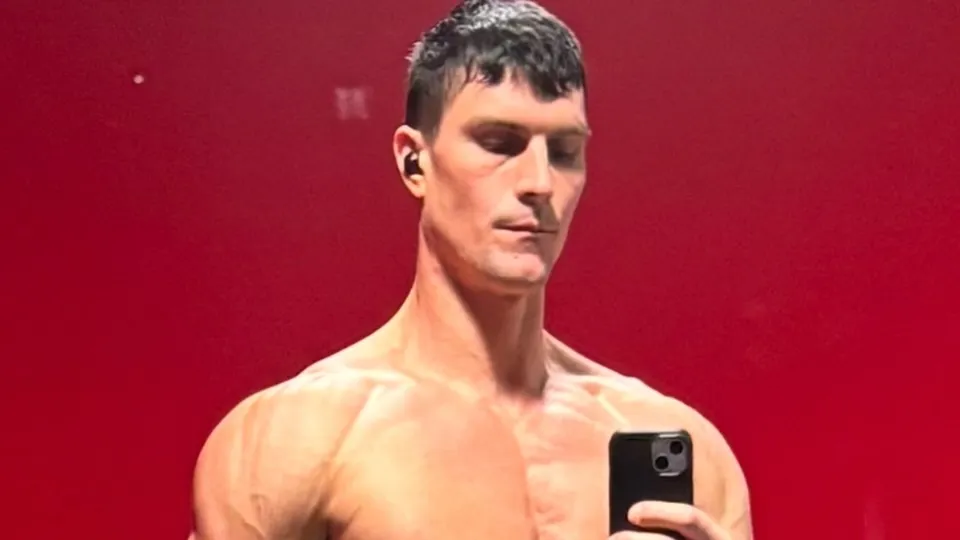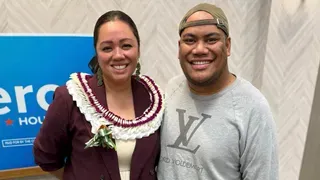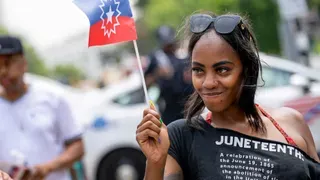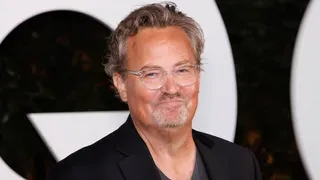January 27, 2014
Playwright Adelina Anthony Discusses "The Beast of Times"
Winnie McCroy READ TIME: 8 MIN.
On January 31, the L.A. Gay & Lesbian Center's Lily Tomlin/Jane Wagner Cultural Arts Center presents "A Night Out at the Theater," a special community event focused on using theater to promote dialogue on the intersection of social issues affecting LGBT communities. The event will showcase an encore performance of "The Beast of Times," the incisive production written and performed by award-winning queer Xicana playwright and performer Adelina Anthony, with a contributed monologue performed by Sri Lankan-American transgender performance artist D'Lo.
This queer political fable explores the contradictions and pains of coming to political consciousness in a world where environmental and ethnic diversity are fast diminishing. Following the performance is a lively community dialogue facilitated by Dr. Tiffany Lopez, theater professor at U.C. Riverside, during which audience members will be invited to participate in a panel discussion on how a wide range of social issues, such as race, gender identity, and environmental justice intersect with the LGBT equality movement.
EDGE spoke with Anthony about the event:
EDGE: Tell me a little more about your play.
Anthony: "The Beast of Times" is a hilarious and thought-provoking ride through an imagined world of queer and politicized animals. As a queer political fable that explores the contradictions and pains of coming to political consciousness, it provides a unique theater experience. The play, in which animals put humans on trial, follows the story of two protagonists -- a dog and a cat -- at odds with each other. One is impassioned about her politicization and joining "the movement," and the other is satisfied with her "creature comforts." "Beast" uses pointed humor and stark drama to expose the human love of greed, in addition to the devastating effects of environmental degradation on the planet's non-human inhabitants.
I conceived and wrote the play knowing D'Lo, a nationally recognized Sri-Lankan transgender performance artist, and I would be performing it as a two-person play, but my hope is that future productions can cast as large as an ensemble as they want. Both D'Lo and I are versatile actors, so we shape-shift into a multitude of characters who are at the intersections of race/ethnicity, sexuality, class and environmental issues to name a few. Having already workshopped and world-premiered it for audiences, we can tell you that every audience has left wholeheartedly entertained and expressing that they've never had a theater experience quite like this one.
Our flyers say that "The Beast of Times" is like "Portlandia" (because it's primarily a two-actor television show) meets the cartoon strip The Far Side, but layered with progressive Queer People of Color politics. If you can imagine all of those elements together on the stage it lends itself to a zany and profound experience. Many of us know the political rhetoric that moves our social justice movements forward, this play moves people's body through intense laughter, unexpected emotions... a story.
EDGE: Where has this story taken you thus far?
Anthony: I received the National Performance Network's Creation Fund at the end of 2010. Once I had D'Lo on board, I started researching for the play in 2011 and we held the first workshop production in May of that year at La Pe�a Cultural Center in Berkeley (our commissioner). After that overwhelming response, I added two more scenes and experimented with the ending again. We took it to Austin, Texas in September through our second co-commissioner, allgo (a Texas Statewide Queer People of Color organization).
Finally, we brought the show to L.A. for one more final workshop production as part of Outfest Fusion's Queer People of Color Film Festival and played it at The Renberg theater in 2012. That's where The Village's producer, Jon Imparato saw it and asked if he could world-premiere it. Knowing the high caliber of works Jon and his team produce, we knew they would give us an ideal production. And they did; the lights and set alone are outstanding.
EDGE: Tell me about the contributed monologue performed by Sri Lankan-American transgender performance artist D’Lo?
Anthony: D'Lo was and continues to be a fantastic collaborator. He was critical to the workshop process, contributing ideas and helping to shape the different characterizations for the script. He's known as a multi-talented artist, but as a solo performer one of his specialties is character monologues. He contributes a monologue entitled, "I Am Holy Idiots," and without giving too much away, it's about a South Asian bull who wants to be a cow. This bull-cow is how D'Lo brings in transgender issues in a world populated by animals with distinctive sexualities, desires and motives for participating in this imagined "trial against humanity."
D'Lo and I have been friends for almost eight years and have been collaborating together in different capacities. It was a real joy to work with him in a show as a co-performer and to have his creative contributions all the way through. He's a real talent in our communities. He has audiences in stitches through his characterization work in this play.
EDGE: Why was it important to hold this event and panel discussion at the Lily Tomlin/Jane Wagner Cultural Arts Center?
Anthony: This play is for LGBTQ folks and allies of all stripes, and holding this event at the L.A. Gay & Lesbian's Renberg Theatre is not only a reflection of the audiences we're trying to reach, this is also where our play world-premiered in June, and we would not be having this encore performance and series of panels without The Village's support.
More importantly, when people come and see the play all of the proceeds support the Homeless Youth Shelter run by the L.A. Gay & Lesbian Center. So people not only get to experience a great evening at the theater, they contribute to the success of the Center's social programs. This is truly a safe space for us to hold this kind of event and necessary dialogue.
EDGE: What social justice and gender identity issues will you discuss at the panel discussion?
Anthony: In a very humorous vein, the play tackles economic racism, eco-destruction, corporate greed, class, and female reproductive issues -- many of us are politically agitating for these social justice issues, and because the characters span the gender gamut (male, female, androgynous, etc.) these various identities are intertwined with these same social issues.
Each evening a different scholar/theater practitioner will lead and frame the discussion for our weekend of encore performances. In many ways, what we discuss will also depend on the audience and what they contribute in terms of questions and observations.
On opening night we have Professor Tiffany Ana L�pez from the UC Riverside Theater department, who saw the play during its initial run and who is currently teaching the play to her students. On the following evening we have Professor Stacy Macias who will join us from Nevada, where she teaches in the Women's Studies Department; she also wrote the foreword for the published version of this play and brings in a Queer Chicana lens to examine all of the layers of the play. And finally, on closing night we have Jes�s Reyes, the Artistic Director from East L.A. Rep; he also saw the show during the world-premiere and has a strong pulse on contemporary productions in L.A.
EDGE: How can a theater event like yours intersect with the LGBT community’s fight for equality and rights?
Anthony: The most impactful social movements incorporate and rely on art as a vehicle for social change. Ours is no different. A lot of people turn off to political rhetoric, but when you give them an artistic experience that moves them emotionally and intellectually, the potential for pushing our rights and equality forward expands exponentially. In our movements we're asking people to see us for our complex humanity -- and here is a play couched at the intersections of our existence, which allows for multiple points of entries into discussing our struggles for equality.
It's also on purpose that these characters are at different places of their own political consciousness, because as quite often happens in our collaborations and coalition movements we do work with individuals at different stages of political consciousness and growth. We are all always growing, or at least have the potential to do so. I guess what I'm saying is that despite all of the humor and fun we can guarantee, this play intersects with our real world issues; and bringing LGBTQ persons and allies together in this cultural space allows for a fresh way for us to enter into conversation and organizing together.
"A Night Out at the Theater" will take place at 8 p.m. on Friday, January 31 at the Renberg Theatre, at The Village at Ed Gould Plaza, 1125 N. McCadden Place in Hollywood. For information or tickets, call 323-860-7300 or visit lagaycenter.org/theatre
Winnie McCroy is the Women on the EDGE Editor, HIV/Health Editor, and Assistant Entertainment Editor for EDGE Media Network, handling all women's news, HIV health stories and theater reviews throughout the U.S. She has contributed to other publications, including The Village Voice, Gay City News, Chelsea Now and The Advocate, and lives in Brooklyn, New York.





